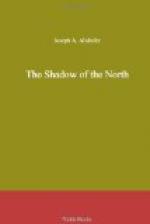“I’m sorry for Tayoga,” he said to Robert. “Just when you and Willet were boasting most about him this winter rain had to come and he was no more than fairly started. He’ll have to hunt a den somewhere in the forest and crouch in it wrapped in his blanket.”
Robert smiled serenely.
“Den! Crouch! Wrapped in his blanket! What do you mean?” he asked in his mellow, golden voice. “Are you speaking of my friend, Tayoga, of the Clan of the Bear, of the nation Onondaga, of the great League of the Hodenosaunee? Can it be possible, Wilton, that you are referring to him, when you talk of such humiliating subterfuges?”
“I refer to him and none other, Lennox. I see him now, stumbling about in the deep forest, looking for shelter.”
“No, Wilton, you don’t see Tayoga. You merely see an idle figment of a brain that does not yet fully know my friend, the great young Onondaga. But I see him, and I see him clearly. I behold a tall, strong figure, head slightly bent against the rain, eyes that see in the dark as well as yours see in the brightest sunlight, feet that move surely and steadily in the path, never stumbling and never veering, tireless muscles that carry him on without slackening.”
“Dithyrambic again, Lennox. You are certainly loyal to your friend. As for me, I’m glad I’m not out there in the black and wet forest. No human being can keep to his pace at such a time.”
Robert again smiled serenely, but he said nothing more. His confidence was unlimited. Presently he wrapped around his body a rude but serviceable overcoat of beaver skin that he had made for himself, and went out. The cold, drizzling icy rain that creeps into one’s veins was still falling, and he shivered despite his furs. He looked toward the northeast whither Tayoga’s course took him, and he felt sorry for his red comrade, but he never doubted that he was speeding on his way with sure and unfaltering step.
The sentinels, mounted on the broad plank that ran behind the palisade, were walking to and fro, wrapped to their eyes. A month or two earlier they might have left everything on such a night to take care of itself, but now they knew far better. Captain Colden, with the terrible lesson of the battle in the bush, had become a strict disciplinarian, and Willet was always at his elbow with unobtrusive but valuable advice which the young Philadelphian had the good sense to welcome.
Robert spoke to them, and one or two referred to the Indian runner who had gone east, saying that he might have had a better night for his start. The repetition of Wilton’s words depressed Robert for a moment, but his heart came back with a bound. Nothing could defeat Tayoga. Did he not know his red comrade? The wilderness was like a trimmed garden to him, and neither rain, nor hail, nor snow could stop him.
As he said the word “hail” to himself it came, pattering upon the dead leaves and the palisade in a whirlwind of white pellets. Again he shivered, and knowing it was no use to linger there returned inside, where most of the men had already gone to sleep. He stretched himself on his blanket and followed them in slumber. When he awoke the next morning it was still hailing, and Wilton said in a serious tone that he hoped Tayoga would give up the journey and come back to Fort Refuge.




